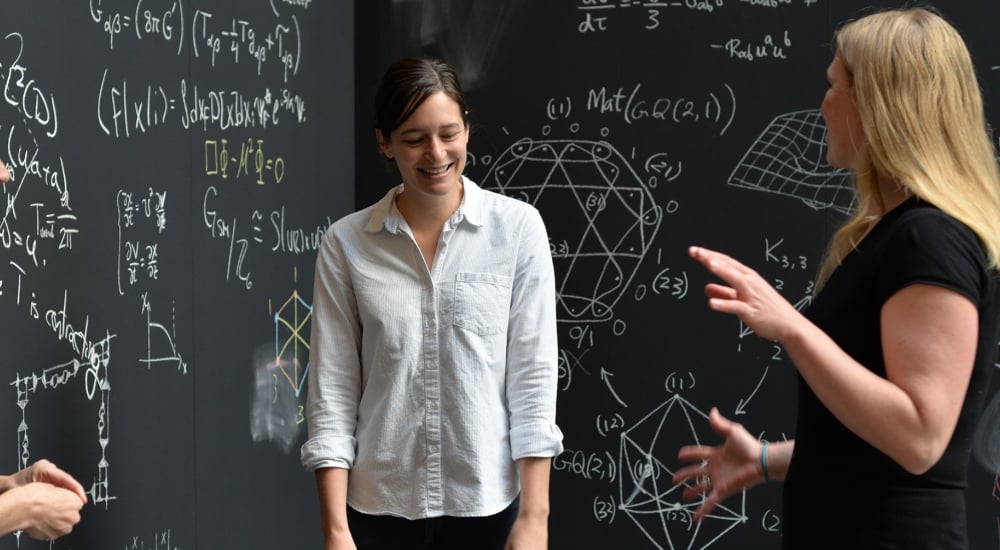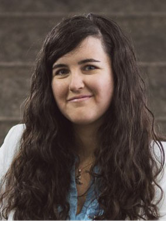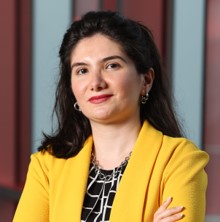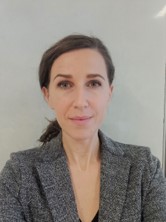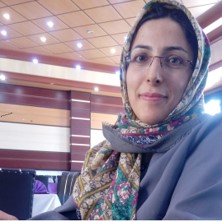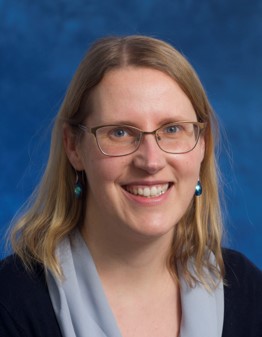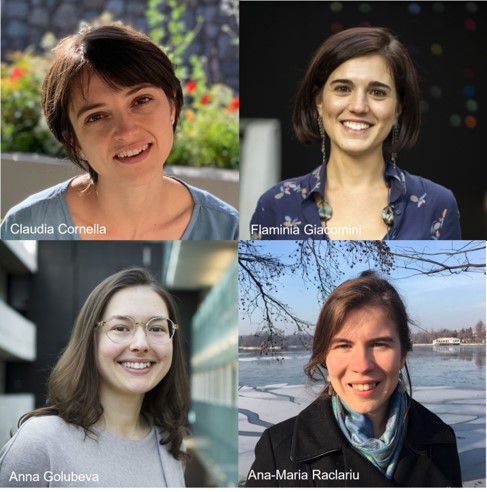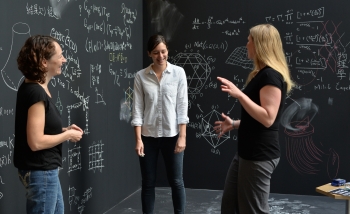Each year, the Simons Emmy Noether Fellowship program brings a select group of outstanding physicists from around the world to Perimeter, supporting their research and enabling new collaborations. The program provides a valuable opportunity for early- and mid-career women at critical stages of their academic journey. This year, we are pleased to welcome seven new Simons Emmy Noether Fellows, as well as – for the first time – four Simons Emmy Noether Visiting Postdoctoral Researchers:
Angela Capel is a Junior Professor of "Mathematical Methods of Quantum Theory" in the area of Mathematical Physics at Eberhard Karls Universität Tübingen. Her research interests lie at the interface between Quantum Information Theory and Quantum Many-Body Systems, with a special interest in Quantum Functional Inequalities and Entropic Inequalities. As a Simons Emmy Noether Fellow, Capel aims to study the relation between the convergence of thermal evolutions of quantum many-body systems and the decay of correlations on Gibbs states of local Hamiltonians, with a focus on the differences arising between short and long-range interactions.
Selected publications:
I. Bardet, Á. Capel, L. Gao, A. Lucia, D. Pérez-García and C. Rouzé, Rapid thermalization of spin chain commuting Hamiltonians, Physical Review Letters, 130, 060401, 2023, DOI: 10.1103/PhysRevLett.130.060401
A. Bluhm, Á. Capel, P. Gondolf and A. Pérez-Hernández, Continuity of quantum entropic quantities via almost convexity, IEEE Transactions on Information Theory (to appear), 2023, DOI:10.48550/arXiv.2208.00922
A. Bluhm, Á. Capel and A. Pérez-Hernández, Exponential decay of mutual information for Gibbs states of local Hamiltonians, Quantum, 6, 650, 2022, DOI: 10.22331/q-2022-02-10-650
Á. Capel, C. Rouzé and D. Stilck França, The modified logarithmic Sobolev inequality for quantum spin systems: classical and commuting nearest neighbour interactions, Communications in Mathematical Physics (to appear), 2023, DOI:10.48550/arXiv.2009.11817
Zohreh Davoudi is a faculty at the Physics Department at the University of Maryland, College Park since 2017. She is also a Fellow of Maryland Center for Fundamental Physics and a Senior Investigator and the Associate Director of Education for the NSF’s Institute for Robust Quantum Simulation. Davoudi received her Ph.D. in 2014 from the University of Washington in Seattle, and shortly thereafter joined the Massachusetts Institute of Technology's Center for Theoretical Physics as a post-doctoral research associate. She was also a faculty affiliate with the RIKEN research program until 2020. Her research involves studying strongly interacting systems in Nature, such as hadrons and nuclei, using theoretical and computational methods including effective field theories, lattice gauge theory, quantum simulation, and quantum computing. Her work is recognized by the US Department of Energy's Early Career Award (2019), Alfred P. Sloan Fellowship (2019), and Kenneth Wilson Award for Excellence in Lattice Gauge theory (2018). As a Simons Emmy Noether Fellow, she looks forward to expanding her research in quantum simulation and quantum information for nuclear and particle physics at the Perimeter Institute (PI), and to collaborating with the researchers at the PI and at the nearby Institute for Quantum Computing (IQC) at the University of Waterloo.
Selected Publications:
Quantum Simulation for High-Energy Physics
Proton-Proton Fusion and Tritium β Decay from Lattice Quantum Chromodynamics
Laura Donnay is a theoretical physicist and Assistant Professor at SISSA (Italy). She obtained her PhD at the University of Brussels and held postdoctoral positions at Harvard University and the Technical University of Vienna. Her research focuses on classical and quantum aspects of gravity, especially on the emergence of infinite-dimensional symmetries that arise at spacetime boundaries, such as the near-horizon region of black holes and at the boundary of asymptotically flat spacetimes. Her future work aims at developing a holographic correspondence for realistic spacetimes and will be supported by a prestigious ERC Starting Grant.
Selected publications:
L. Donnay, A. Fiorucci, Y. Herfray, R. Ruzziconi, "A Carrollian Perspective on Celestial Holography'', Phys. Rev. Lett. (2022), arXiv:hep-th/2202.04702.
L. Donnay, C. Marteau, "Carrollian Physics at the Black Hole Horizon'', Class. Quant. Grav. 36 (2019) 16, arXiv:hep-th/1903.09654.
L. Donnay, A. Puhm, A. Strominger, "Conformally Soft Photons and Gravitons'', JHEP 01 (2019) 184, arXiv:hep-th/1810.05219.
L. Donnay, G. Giribet, H. A. Gonzalez, M. Pino, "Supertranslations and superrotations at the horizon'', Phys. Rev. Lett. 116 (2016) 091101, arXiv:hep-th/1511.08687.
Marina Krstic Marinkovic is a tenure-track Assistant Professor at ETH Zürich and one of the founding members of RC* collaboration, investigating algorithmic advances and large scale simulations of the strong and electromagnetic interactions in the Standard Model of particle physics. Prof. Marinkovic earned her Ph.D. from the Humboldt University of Berlin, followed by two years as a postdoc at the University of Southampton, and three years as a Senior Research Fellow at CERN. Prior to joining ETH, she held Hitachi Assistant Professorship in High Performance Computing at Trinity College Dublin, and a junior professorship position at Ludwig Maximilian University of Munich. Her research focuses on the interface between theoretical and computational aspects of lattice gauge theories and other strongly interacting systems. Scientists worldwide have used Marinkovic's simulation packages for precise QCD calculations, which are based on advanced algorithms and optimized for high performance computing infrastructures. In addition to pioneering first principle calculations for particle physics, her research on novel quantum algorithms for NISQ devices was recently recognized by the Google Faculty Research Award.
Recent publications:
Sandip Maiti, Debasish Banerjee, Shailesh Chandrasekharan, Marina K. Marinkovic (Jul 8, 2023) “A qubit regularization of asymptotic freedom at the BKT transition without fine-tuning.”
RC* Collaboration, Lucius Bushnaq et al. (Sep 27, 2022) “First results on QCD+QED with C* boundary conditions.”
Marina Krstic Marinkovic, Marina Radulaski (Aug 25, 2022) “Complexity reduction in resonant open quantum system Tavis-Cummings model with quantum circuit mapping.”
Verónica Errasti Díez, Marina Krstic Marinkovic (Dec 21, 2021) “Symplectic quantization of multifield generalized Proca electrodynamics.”
Ferah Munshi is an assistant professor at George Mason University (GMU) in the Department of Physics and Astronomy. Munshi is a theoretical astrophysicist specializing in galaxy formation simulations as a tool to understand the nature of dark matter in both the widely accepted Cold Dark Matter (CDM) model and alternative dark matter models, like Self-Interacting Dark Matter (SIDM). Previous to GMU, Munshi was an assistant professor at the University of Oklahoma and a VIDA postdoctoral fellow at Vanderbilt University after receiving her PhD from the University of Washington. At Perimeter, Munshi hopes to constrain both existing and new dark matter models with galaxy formation simulations in order to make testable predictions for future observations (from, for example, the Roman Space Telescope) with a particular focus on the smallest galaxies-- dwarf galaxies.
Selected publications:
https://ui.adsabs.harvard.edu/abs/2021ApJ...923...35M/abstract
https://ui.adsabs.harvard.edu/abs/2019ApJ...874...40M/abstract
https://ui.adsabs.harvard.edu/abs/2013ApJ...766...56M/abstract
https://ui.adsabs.harvard.edu/abs/2022arXiv220307049B/abstract
Sedighe Sajadian is an assistant professor at the Physics Department at the Isfahan University of Technology, Isfahan, Iran. She works on gravitational microlensing and its application. She is also a member of the MiNDSTEp group, which does follow-up observations of microlensing and transit events with the Danish telescope. Concerning this collaboration, she does data-reduction and PSF modelling of images taken by the Danish 1.54 m telescope. Thanks to the Simons Emmy Noether's fellowship, she will be able to work with scientists at the Perimeter Institute on theoretical and numerical aspects of gravitational microlensing observations with the new generation of telescopes. Such a collaboration will be a great opportunity, and she appreciates the Perimeter Institute.
Recent publications:
Fatheddin, Hossein and Sedighe Sajadian (Mar. 2023). “A Statistical Relation between Mass, Age, and Velocity Dispersion in the Solar Neighborhood”. In: ApJ 945.1, 75, p. 75. doi: 10.3847/1538-4357/acb548. arXiv: 2212.13349 [astro-ph.GA].
Sajadian, Sedighe (June 2023). “Numerically studying the degeneracy problem in extreme finite-source microlensing events”. In: MNRAS 521.4, pp. 6383–6391. doi: 10.1093/mnras/stad945. arXiv: 2304.09529 [astro-ph.IM].
Sajadian, Sedighe and Kailash C. Sahu (Mar. 2023). “Detecting Isolated Stellar-mass Black Holes with the Roman Telescope”. In: AJ 165.3, 96, p. 96. doi: 10.3847/1538-3881/acb20f. arXiv: 2301.03812 [astro-ph.GA].
Sajadian, Sedighe and Parisa Sangtarash (Apr. 2023). “Microlensing due to free-floating moon-planet systems”. In: MNRAS 520.4, pp. 5613–5621. doi: 10.1093/mnras/stad484. arXiv: 2302.05230 [astro-ph.EP].
Thomas, Cristina A. et al. (Mar. 2023). “Orbital Period Change of Dimorphos Due to the DART Kinetic Impact”. In: Nature 616, pp. 448–451. doi: 10.1038/s41586-023-05805-2. arXiv: 2303.02077 [astro-ph.EP].
Cora Uhlemann is a Reader in Cosmology at Newcastle University and will start as a Professor at Bielefeld University in March 2024. She is working on modelling the cosmic large-scale structure and using it as a laboratory for fundamental physics. She co-leads the Additional Galaxy Clustering Probes work package of the Euclid space mission to map the dark universe and is a member of the higher-order statistics topical team of the Rubin Observatory Legacy Survey of Space and Time.
Since studying theoretical physics in Emmy Noether’s homeland, Cora likes to connect ideas from different branches of physics and mathematics. During her PhD at the LMU Munich, she worked on describing dark matter dynamics using the quantum-classical correspondence, something she plans to further pursue at Perimeter. While a postdoc at the Dutch Delta Institute for Theoretical Physics and later the Stephen Hawking Centre for Theoretical Cosmology in Cambridge, Cora focused on predicting the statistics of the large-scale matter distribution with large-deviation theory. With her recently awarded ERC Starting Grant, she will bring both ideas together for “Probing cosmic large-scale structure beyond the average” with galaxy surveys covering unprecedented wide areas of the sky. Cora is passionate about supporting initiatives for women and gender minorities in physics, such as the German Physical Society “Physikerinnnen” program led by Ulrike Boehm.
Selected publications:
Making (dark matter) waves: Untangling wave interference for multi-streaming dark matter
A semiclassical path to cosmic large-scale structure
Fisher for complements: Extracting cosmology and neutrino mass from the counts-in-cells PDF
Back in the saddle: Large-deviation statistics of the cosmic log-density field
2023 Simons Emmy Noether Visiting Postdoctoral Researchers
2023 marks the launch of Perimeter’s Simons Emmy Noether Visiting Postdoctoral Fellows program. The four inaugural fellows are: Claudia Cornella (Johannes Gutenberg-Universität Mainz), Flaminia Giacomini (ETH Zurich), Anna Golubeva (MIT) and Ana-Maria Raclariu (University of Amsterdam).
The Simons Emmy Noether Fellowship program at Perimeter Institute is supported by the Simons Foundation.
About PI
Perimeter Institute is the world’s largest research hub devoted to theoretical physics. The independent Institute was founded in 1999 to foster breakthroughs in the fundamental understanding of our universe, from the smallest particles to the entire cosmos. Research at Perimeter is motivated by the understanding that fundamental science advances human knowledge and catalyzes innovation, and that today’s theoretical physics is tomorrow’s technology. Located in the Region of Waterloo, the not-for-profit Institute is a unique public-private endeavour, including the Governments of Ontario and Canada, that enables cutting-edge research, trains the next generation of scientific pioneers, and shares the power of physics through award-winning educational outreach and public engagement.
You might be interested in
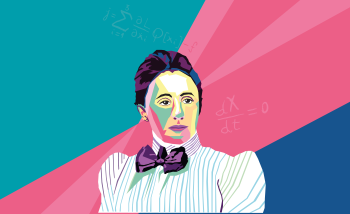
Eight new Simons Emmy Noether Fellows are ready to make waves
August 13, 2024

